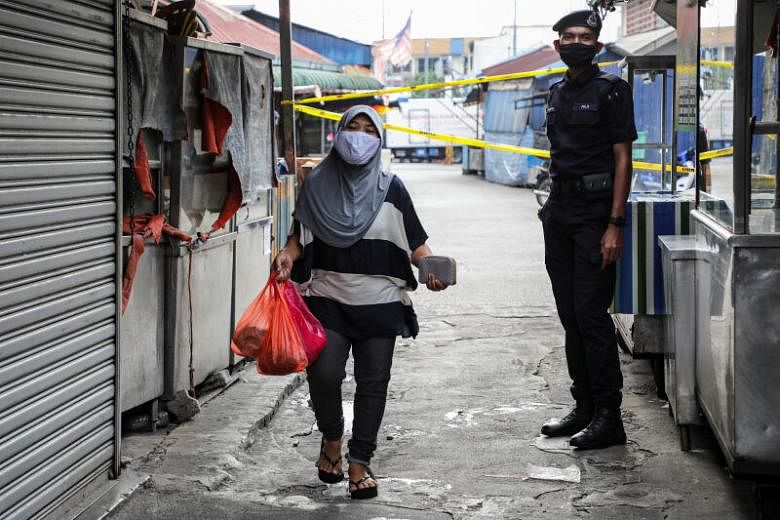KUALA LUMPUR - For most households, Malaysia's Movement Control Order (MCO) has meant the annoyance of being cooped up at home, counting the days - at least 28 for now - as the authorities try to limit human contact to curb transmission of the coronavirus.
But for some in the country of 32 million, the stay-home order has resulted in the opposite of the much-vaunted "social distancing" method to "flatten the curve" of infections.
Hundreds of thousands live in low-cost public housing where some units - typically less than 60 sq m - have over a dozen people piled into them.
And then there is the unskilled foreign labour - two million legal and anywhere up to double that undocumented - who often share tight spaces as close as possible to work to reduce cost and rack up as many hours on the clock as they can.
"I'm renting a small room on top of a shoplot in Petaling Jaya with two other friends for RM500 (S$165), the size of the room is roughly 10 sq m," said Bangladeshi wiring technician Shohel Mollah, 29, referring to the satellite city next to Kuala Lumpur. "Two other rooms are also being rented by six others, so there are nine of us."
Despite taking precautions, such as having one person buy groceries for everyone and immediately showering and washing their clothes upon returning, they live in fear of contracting the virus.
"We keep on asking ourselves what if one of us contracts it without knowing because we're living in such a cramped place?" he told The Straits Times.
Meanwhile, many poor citizens are also living in cheap housing, with several generations of a family, or even several families sharing the space. According to MP Fahmi Fadzil, whose constituency Lembah Pantai is in Kuala Lumpur, low-cost government flats "are very densely populated", with each block having up to 18 floors and 20 units per floor, and anywhere from two to 12 people per unit.
Even smaller families like Kuala Lumpur City Hall officer Norden Sohed's - five people living in a home of about 60 sq m - find life "scary" in these low-cost flats
"My fear now is some neighbours are still seen spending their time outside. The density of this area is high, I dread imagining if one catches the virus," he told ST.
But needs must for these families. Mr Norden, 58, is allowed to work from home, but his son has to head out daily as an employee of the postal service.
Ms Noor Ikzaurdi Mohamed, a 44-year-old single mother in Penang, was reported by The Malaysian Insight as being the only breadwinner - others in her family cannot work under the MCO - in her family's low-cost flat which also houses her five children, mother and two brothers. But she only makes RM5.60 per hour, limited to five hours daily, as restaurants are now restricted to takeaways and deliveries.
Mr Shohel and other workers like him are paid for a day's labour, and the MCO - the authorities have ordered the shutdown of all non-essential activities - means they have zero income.
"I've stopped sending money to my family in Bangladesh. I'm not sure whether they have enough to sustain themselves. For now, we're still able to afford two meals a day but I think we would have to cut down to one later," he said.
Concerns of being "too close for comfort" aren't limited to just the most vulnerable. Thanks to the advent of "co-living" - where premium apartment units in urban centres are subdivided into several rooms - up to 100 white-collar professionals and long-term tourists can share common lounges, kitchens, entertainment rooms and fitness centres.
Sama+, located next to Taylor's University near Kuala Lumpur, closed its common areas when the MCO began on March 18 and insisted those entering the main lobby must wear a face mask. Co-Coon, in the heart of Kuala Lumpur, faced some debate among tenants over whether to lock up their shared facilities but eventually did so on March 24.
Co-Coon told ST that "we have increased the frequency of cleaning in all areas. Hand sanitisers are available in common areas for all", as "the health and safety of all our tenants, staff and service providers are our utmost priority".
One resident, who wanted to be known as Adam, said he had already been avoiding the common areas for more than a week before the MCO was put in place.
"Management has been careful. If anyone entering the building has a temperature above 37 degrees Celsius, they will get medical assistance first," he said.
But aside from physical health, the movement curbs have been a mental strain for all, no matter the social strata. Mr Adam misses "meeting my friends at the mamak" stall.
Mr Norden said: "We agree the MCO is necessary. But it's taking a toll on our mental and emotional health."











